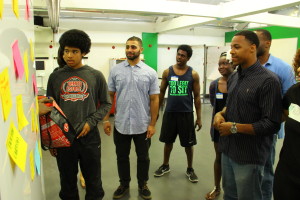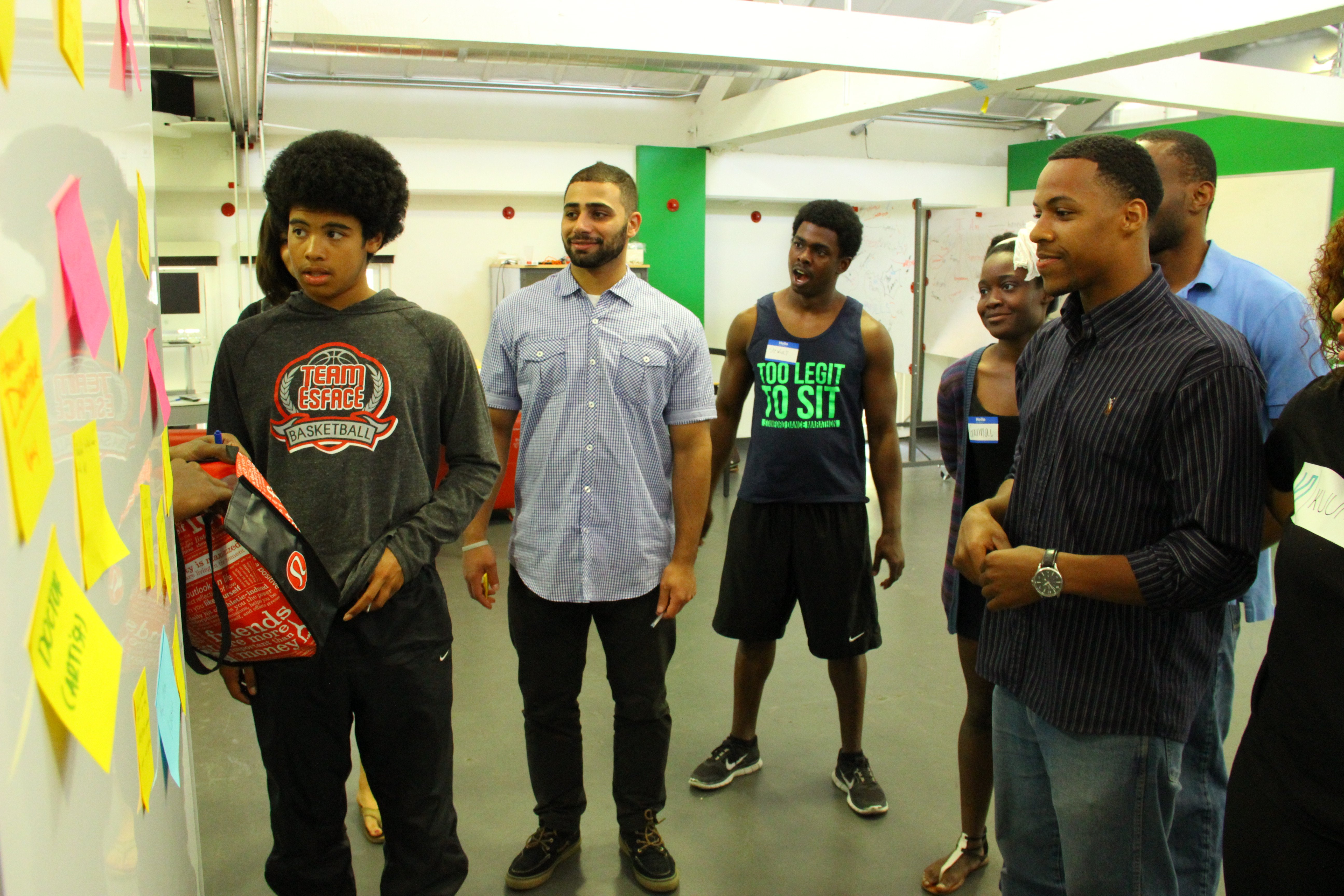
Sponsored by the Hasso Plattner Institute of Design (d.school) and the Black Community Services Center, Enza Academy, a recent startup that focuses on empowering low-income youth, embraces its slogan, “Design your revolution.”
The group holds workshops every Saturday morning for mentors to help students discover their creative capabilities through different educational activities. By building students’ senses of self-esteem and confidence, the academy provides them with a base for achievement.
Support for Enza
The Enza team, now composed of around 20 mentors, has been working on creating the academy since last winter. They wanted to develop a program that helps minorities in the Bay Area construct ideas for how to work on problem solving, as well as to learn about their culture and history, according to Brandon Hill ’16, the founder of Enza Academy.
“What happens when you pair low-income students with marginalized backgrounds with the tools to architect their own futures, and also solutions to their own ecosystems, instead of people doing it for them?” Hill said. “You get a really exciting outcome – so we just came together and want to make a difference.”
In May 2014, Enza won the Zahn Innovation Challenge, a social entrepreneurship competition run through the City College of New York. It received two awards and a grant of $4,000 to help kick-start their company.
According to Hill, the money will go directly to the welfare of the students. Enza plans to use the funds for transportation and materials for the students.
Many other organizations, including the d.school and the Black Community Services Center, also support Enza by providing the students with transportation and lunches.
Growth
Although Enza started with only six students at its first workshop on April 27, the academy has grown to more than 20 participants in just a few short months. There is no age limit for prospective students, and all children ranging from elementary school to high school are welcome.
“We haven’t restricted the age,” said Enza team member Mikos Jenkins. “We want to bring in as many students as possible.”
Jenkins explained that the current Enza students are mostly high school sophomores working on learning more about the college application process.
“They can benefit more because they have the time to make the changes to get into the schools that they want to apply to,” Jenkins said.
However, a few younger students have also joined the workshops, typically with their older siblings. One student, a nine-year-old girl named Tochelle, used the workshop and its allotted problem-solving segment to design a bully-prevention contraption.
Her device alerts teachers of a problem when a student pushes a button. Tochelle’s invention is a display of not only the values and moral lessons being taught at Enza but also the different, creative problem-solving methods that are being built.
“You see nine-year-olds being social entrepreneurs,” Hill said. “That’s really inspiring.”
Identity, trajectory and design
In addition to building self-confidence and learning problem-solving skills, the students are taught three main principles that they develop further over time: identity, trajectory and design.
To focus on identity, mentors use presentations that help the students gain a better understanding of their history and heritage. Using relatable historical figures as role models, Enza encourages students to realize that their actions can make a difference, too.
“We call that ‘standing on the shoulders of giants’ to get them to try and acknowledge that their success has been continual,” said mentor Amber Farrell ’15.
Trajectory learning helps students plan for their future, according to Hill. Students are given advice and guidance about career options and college choices, and Enza provides resources such as money to assist putting their plans into actions.
“[Trajectory] is basically empowering them to be their own change-makers and agents,” Hill said.
Design, the last component, pushes students to practice their problem-solving skills. Students recognize real-life problems around and in their communities and try to come up with creative, helpful solutions for the issues.
Revolutionizing their futures
According to Hill, the Enza mentors also instruct pupils about the three types of revolution that occur at Enza: revolution in itself, revolution in the future and revolution in community. These ideals focus on heritage awareness, trajectory and big dreams for pupils’ future.
Enza, which means both “generate” and “generation” in Zulu, also helps students work toward becoming entrepreneurs, pioneers and innovators.
“We believe all children are born with the creative ability to change the world we live in,” Hill said. “And we aim to empower youth to be change-agents in their own lives in the ecosystems around them.”
Hill also explained that the prominent startup industry in the Bay Area has caused Enza Academy to concentrate on innovative challenges.
“People are using creativity to create and build problems out in the world,” Hill said. “That entrepreneurial process is such a valuable learning force.”
By focusing on identity, trajectory, design and revolution, the mentors help the students create solid plans for their futures that are achievable. Tangible resources are given to further help the students’ progress.
Enza concentrates on helping students who may not have had previous encouragement to understand their own identities and goals and to believe in themselves.
“We want to bring about change in a lot of these communities that are overlooked or underserved.” Hill said.
Contact Yuki Klotz-Burwell at klotzburwell ‘dot’ yuki ‘at’ gmail ‘dot’ com.
